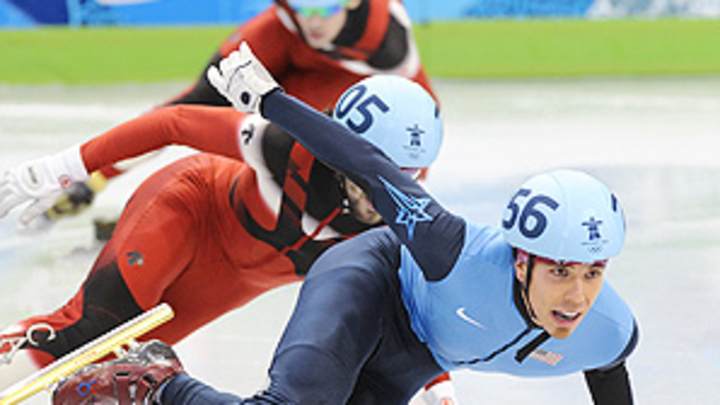2014 may be last Winter Olympics for Apolo Anton Ohno


LOS ANGELES (AP) -- Apolo Anton Ohno is still pondering a final run at the Olympics.
With barely a year to go until the Sochi Games, the most decorated U.S. winter athlete is weighing what role he wants to play in 2014.
Ohno plans to be in Russia for the games, either competing or working in an off-ice gig.
"I've not made an official decision either way," he told The Associated Press. "I very much love the sport."
The short-track speedskater who first took the world by storm at the 2002 Winter Olympics as the star of a sport known as roller derby on ice will be 31 in Sochi. He's been contemplating retirement ever since he earned his eighth career medal three years ago in Vancouver.
But the internal debate goes on.
"For me it's about really committing myself back to the sport," he said. "Do I really want to make another team or do I want to play a different role?"
Ohno has a voracious appetite for training that is reflected in some of his off-ice pursuits, including two stints on "Dancing With the Stars" and running the New York City Marathon in under 3 1/2 hours.
"Physically, I feel like I can make a decision very quickly, but it's more about gaining the experience back and getting the rust out of your skates," he said.
Guy Thibault, new coach of the U.S. national team, has been watching Ohno's dithering with interest.
"With his fitness level, he can be back to where he was easily. I'm guessing he's not that far off. It's a matter of going on the ice," he said. "It's interesting to see how he feels about it. He doesn't say no, doesn't say yes."
National team members J.R. Celski and Lana Gehring are curious to know Ohno's plans.
"It would be kind of fun to see him on the ice again, but it's kind of getting to crunch time, so I don't know," she said.
Celski added, "He's a legend in the sport."
Ohno said he keeps in touch with some of his skating buddies and watches short-track competitions. He'll be in South Korea doing sponsor work with a chance to get on the ice later this month.
"I've been able to take a long break from the sport. It's been so refreshing. It's been exactly what I needed," he said. "It's allowed me to accomplish and do a lot of specific things that I never had time for."
Ohno worked as a correspondent for NBC Sports at the London Olympics, his first games as a spectator. He saw his friend Michael Phelps end a storied career as the most decorated Olympian ever after the swimmer failed to medal in his first race.
"Champions all get kicked when they're down," Ohno said. "He came back stronger than anyone even realized. That was inspirational to me."
Ohno made history in Vancouver, winning three medals in what were essentially his hometown games, having grown up three hours south in suburban Seattle. That gave him eight for his career, the most short track medals of any skater.
"If I had not had that experience my body would be yearning for and wondering what else can you do?" he said.
U.S. Speedskating would gladly welcome back the skater who put short track on the map in this country. Ohno's looks and famous soul patch made him a huge hit with female fans while his close calls on the ice had viewers on the edge of their seats watching a sport most didn't know existed before 2002.
"The window is closing pretty quickly if it hasn't closed already for the potential to come back," said Mark Greenwald, executive director of U.S. Speedskating. "But when you have a talent like him and J.R., these people are capable of amazing things. You never count them out. It would be foolish to think (Apolo) couldn't do something like that (come back)."
While Ohno carefully considers his future, he's quietly been dealing with a respiratory condition that can be triggered by breathing in cold, dry air during exercise for his entire career.
Known as exercise-induced bronchospasm or EIB, the condition may cause the airways in the lungs to become irritated and temporarily get smaller or become constricted. It's estimated that more than 30 million Americans experience EIB symptoms during exercise, including shortness of breath, chest tightness, wheezing or noisy breathing, coughing or decreased exercise endurance.
Ohno has become part of a public education campaign sponsored by Teva Pharmaceuticals, the maker of the inhaler ProAir HFA.
He was diagnosed with EIB in 2000, having wondered for the previous three years what was causing his reduced lung capacity. In a sport where races last between 40 seconds and 2 1/2 minutes, Ohno needs every last breath.
"I never have really talked about any of my injuries or ailments publicly," he said. "The reality is the one that impacted me the most, that could have made or broken my career is the fact that I had EIB. If I had never gotten diagnosed properly, I would have had no idea how to reach my full potential."
Ohno credited the correct diagnosis with his success at his first Olympics.
To comply with doping rules, Ohno had to show clinical proof that he had the condition and needed to use bronchodilators to treat bronchospasms and open the airways.
"Some days I notice it much worse than others," he said. "The marathon, I significantly noticed it, especially in the longer runs."
Ohno said he decided speak out now because dealing with the condition has become second nature to him.
"My mantra has always been to have zero regrets in life," he said. "Everything I do at one speed, I go all-out."
